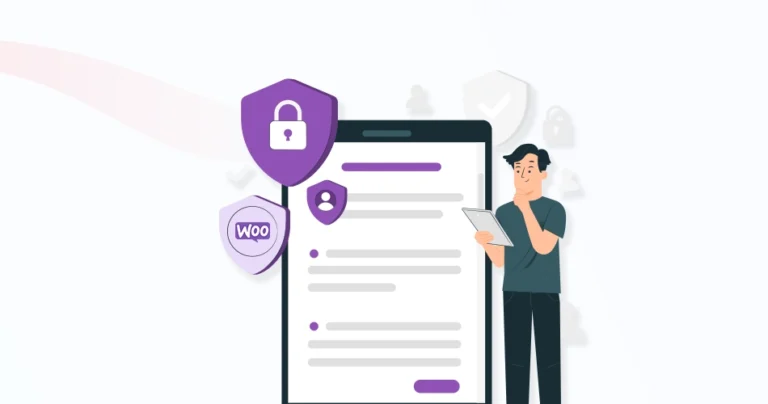Imagine your store – shelves stocked, lights bright, and customers browsing. But what if the back door is wide open? Similarly, what if you have stocked the best products and marketed your WooCommerce site to its best potential, but the security isn’t that good? Well, then the customers will be hesitant to visit your eStore and rightfully so. So what’s the solution?
Well, a WooCommerce security audit would be helpful. It’s like having a security guard for your online store. This methodical examination is used to evaluate your WooCommerce website’s defenses. So any weaknesses can be identified and potential break-ins can be prevented.
In this blog, we’ll tell you all about how the WooCommerce experts do security audits on their eStores and the kind of benefits that offers. Let’s begin.
What is a Security Audit?
According to the experts, a majority of the cyberattacks happen on eCommerce websites. So it becomes that much important to have a grip on eCommerce security. That’s where a security audit comes in.
A security audit, or cybersecurity audit, is a comprehensive assessment of an organization’s information systems and the overall security posture. It’s essentially a methodical examination to identify weaknesses and vulnerabilities that could be exploited by attackers. Imagine it as a security checkup for your computer systems and data.
Security audits are crucial for organizations of all sizes, from small businesses to large enterprises. They help to identify and address potential security risks before they can be used to launch a cyberattack. There are different types of security audits, and they can be focused on specific areas of IT infrastructure or be more general in scope.
Why Do You Need WooCommerce Security Audits?
WooCommerce is a part of the WordPress ecosystem. So when you create a WooCommerce store, the foundation is WordPress, which is open-source. So it’s bound to be a little vulnerable to cyberattacks.
So WooCommerce security audits would be beneficial for a bunch of reasons.
Protect Customer Data and Trust
WooCommerce stores hold sensitive customer information like payment details, addresses, and purchase history. A security breach can expose this data, leading to identity theft, financial loss, and a damaged reputation for your business. Regular audits help identify and address vulnerabilities before attackers can exploit them.
Maintain PCI Compliance
The Payment Card Industry Data Security Standard (PCI DSS) outlines specific requirements for businesses that handle credit card information. Security audits ensure your store meets these compliance standards. So there’s minimal risk of hefty fines and potential business disruptions.
Prevent Business Disruptions
A hacked website can experience downtime, data loss, and a tarnished brand image. Security audits can detect malware, vulnerabilities in plugins, and other issues that could lead to disruptions, allowing you to fix them proactively and maintain smooth operations.
Boost Customer Confidence
Customers are increasingly aware of cybersecurity threats and prioritize shopping at secure online stores. A security audit demonstrates your commitment to data protection, fostering trust and loyalty among your customer base.
Stay Ahead of Evolving Threats
The cybersecurity landscape is constantly changing, with new vulnerabilities emerging all the time.
Regular security audits help you stay updated on the latest threats and ensure your store’s defenses are constantly adapting. Need help? hire our WooCommerce development company to implement the security audit on your store. That way, you’ll have peace of mind knowing your store is well-protected. You can focus on growing your business without the constant worry of cyberattacks and data breaches.
What’s Covered in a WooCommerce Security Audit?
A WooCommerce security audit is a comprehensive examination designed to identify and address weaknesses in your online store’s defenses. It covers a wide range of areas to ensure maximum protection, here’s a breakdown of the key elements:
- WordPress Core Security: Ensuring that the WordPress core installation is up-to-date with the latest security patches and updates. This includes reviewing the security settings and configurations of WordPress.
- Plugin and Theme Security: Reviewing all installed plugins and themes to ensure they are from reputable sources, regularly updated, and free from known vulnerabilities. Particular attention is given to WooCommerce-specific plugins and themes.
- User Access Controls: Assessing user roles and permissions to ensure that only authorized users have access to sensitive areas of the website. This involves reviewing user accounts, permissions, and password policies.
- Data Encryption: Verifying that sensitive data such as customer information, payment details, and login credentials are encrypted using secure protocols such as SSL/TLS.
- Payment Security: Ensuring that payment gateways integrated with WooCommerce are compliant with Payment Card Industry Data Security Standard (PCI DSS) requirements and are securely configured.
- Firewall and Malware Detection: Implementing and reviewing firewall settings to prevent unauthorized access and detect and block malicious activity. Additionally, scanning the website for malware and other malicious code.
- Backup and Disaster Recovery: Reviewing backup procedures to ensure that regular backups of the website and its data are being performed and that a disaster recovery plan is in place in case of security breaches or other emergencies.
- Security Headers and Secure Configuration: Implementing security headers such as Content Security Policy (CSP), X-Frame-Options, and X-XSS-Protection to mitigate common web security vulnerabilities. Reviewing server and database configurations for security best practices.
- Logging and Monitoring: Setting up logging and monitoring mechanisms to track and analyze website activity for signs of suspicious behavior or security incidents.
- Security Updates and Patch Management: Establishing procedures for promptly applying security patches and updates to WordPress core, plugins, themes, and other software components to address newly discovered vulnerabilities.
- Security Compliance: Ensuring compliance with relevant security standards and regulations such as GDPR (General Data Protection Regulation) and CCPA (California Consumer Privacy Act).
- Third-Party Integrations: Reviewing any third-party integrations with WooCommerce, such as shipping or inventory management systems, to ensure they are securely configured and do not introduce additional security risks.
These measures cover a comprehensive assessment of the security of your WooCommerce store. You can opt for these security measures as a part of our WooCommerce development services. We will analyze every inch of your eCommerce website to make sure your critical site information and customer data are all safeguarded.
Conclusion
WooCommerce stores hold sensitive customer data like payment details and personal information. A security audit helps identify and address vulnerabilities before attackers can exploit them, protecting your customers’ data, maintaining compliance with regulations, and preventing business disruptions.
A WooCommerce security audit includes significant measures with respect to the core WordPress, plugins and themes, payment gateways, contact forms, and more.So, do you need help with WooCommerce security audit on your eStore? Then let’s have a chat today!
FAQs on WooCommerce Security Audit
Q1. How often should I conduct a WooCommerce security audit?
It’s recommended to conduct security audits regularly, at least once a year. However, with the ever-evolving threat landscape, more frequent audits (every 6 months) might be advisable, especially if your store experiences significant growth or undergoes major changes (e.g., new plugin installations).
Q2. Can I perform a WooCommerce security audit myself?
Yes, you can perform a DIY audit. It involves tasks like updating software, reviewing user permissions, and utilizing vulnerability scanners. However, this requires some technical knowledge and may not be as thorough as a professional audit.
Q3. How much does a professional WooCommerce security audit cost?
The cost of a professional audit can vary depending on the scope of the audit, the experience of the auditor, and the size of your store. It typically ranges from a few hundred dollars to several thousand dollars.
Share this story, choose your platform!
Ankur is a highly experienced E-commerce Platform Expert dedicated to maximizing the online potential of businesses. His deep knowledge spans across leading platforms, including Shopify, Magento, and WooCommerce, among many others. Ankur specializes in guiding companies to effectively leverage these technologies and their capabilities to drive significant growth and success for their online ventures.





